Hormones & IBS
High FODMAP foods are often to blame for IBS flare ups, however stress and hormones can also be potential culprits for gut distress.
If you have noticed that your IBS symptoms are worse at certain times of the month, you are not alone. In this article we would like to share what we know about hormones and how they can affect gastrointestinal functions plus provide some helpful strategies to better manage hormone induced IBS symptoms.
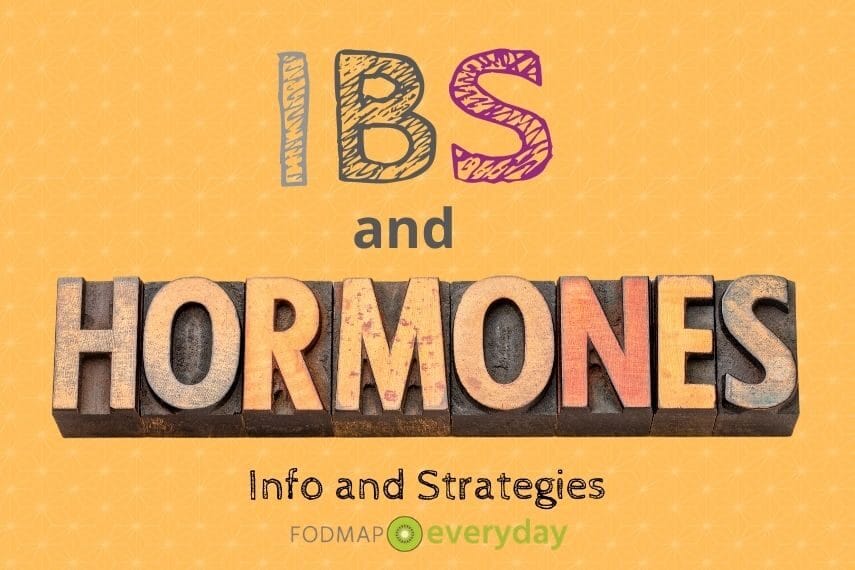
So, What Exactly Are Hormones?
Hormones act as little messengers in the body whose main job is to regulate the major body functions of the endocrine system. The most commonly recognized hormones include estrogen, progesterone, testosterone, adrenaline, and cortisol.
Women are at higher risk of experiencing hormone related IBS fluctuations therefore this article is focused on women’s hormones – specifically estrogen and progesterone.
Do Hormones Affect Women & Men Differently?
Yes, there is strong evidence that gender plays an important role in the development, primary symptoms, incidence, and treatment options for IBS. Women are two times more likely to experience IBS in comparison to men.
Women tend to complain more often of bloating, constipation, abdominal pain and incomplete bowel movements, while men complain more often of diarrhea. Interesting enough, several studies show that women have slower GI transit time, meaning it takes longer for foods to go through the whole digestive tract.
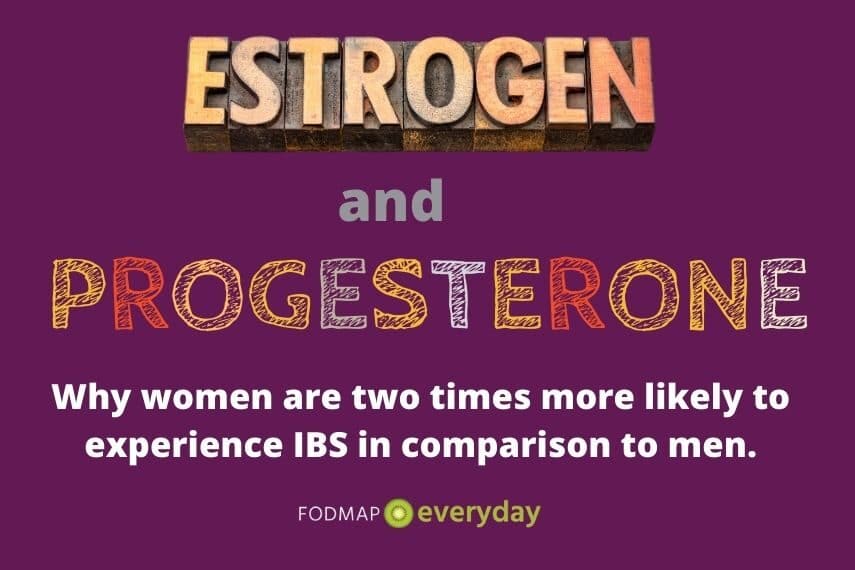
This anatomical difference likely explains why men and women complain of different IBS symptoms. Women also tend to suffer from anxiety and depression more frequently in comparison to healthy women and men with IBS. IBS can negatively affect one’s quality of life and this negative impact appears to be more common in women.
We now have an entire article devoted to explaining Gender Differences & IBS.
Onset of Symptoms
The gender differences between IBS symptoms starts at puberty and often worsens in early adulthood. Women tend to experience greater symptom peaks between their teen years to mid forties and often notice a decline later in life, while men tend to have consistent IBS symptoms from young adulthood to their senior years.
The Hormone Roller Coaster
It is helpful to do a quick flashback of sex ed and review the menstrual cycle. This cycle is divided in four different phase: menstruation, the follicular (proliferative) phase, ovulation, and the luteal (secretion phase).
Estrogen and progesterone levels are at their lowest on the first day of menstruation when women report the higher incidence of stomach pain, diarrhea, bloating, and nausea.
Estrogen levels trend up during the follicular phase, drop soon after ovulation, climb up again midluteal along with progesterone, and then decrease before menstruation.
Bloating occurs more often during the luteal or second half of the menstrual cycles.
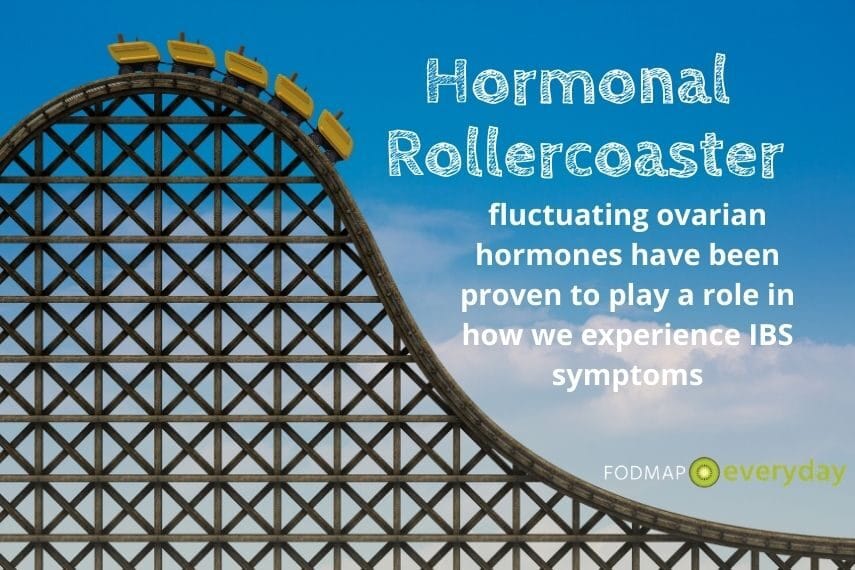
These fluctuating ovarian hormones have been proven to play a role in how we experience IBS symptoms. Why? Sex hormones play a role in regulating our nervous system and this affects the gut brain axis which plays an integral role in the development of IBS and inducing IBS symptoms.
You May Want To Read: IBS & Periods: How Does Your Period Impact Your Gut?
The Gut Brain Axis
The gut brain axis affects visceral sensitivity – meaning many IBS sufferers experience increased sensitivity and pain associated with bloating and gas versus healthy individuals. Sex hormones also affect motility – the stretching and contracting of your intestines during digestion – and transit time – the time it takes foods to move through the GI tract. As you can imagine these factors can greatly affect gas, bloating, abdominal pain, constipation, and diarrhea.
Also affected by these sex hormones is intestinal permeability (which has been shown to be increased in those with IBS-D), fluid and enzyme secretions that can involve pancreatic enzymes which helps us digest our food, and immune functions.
Estrogen helps the body produce more of the feel good chemical, serotonin. When estrogen levels are low we may be more susceptible to abdominal pain and cramping – common menstrual related symptoms.
You May Want To Read: The Gut-Brain Connection & IBS: It’s Not All in Your Head
A Few Facts:
- 40% of women notice the effects of their menstrual cycle on IBS symptoms, water retention, and difficulty concentrating in comparison to 33% of healthy women
- IBS sufferers experience dysmenorrhea (absence of menses) and premenstrual distress syndrome – a more severe version of PMS more often than healthy women.
- Women with PCOS, an endocrine disorder is more common in women who have a higher incidence of IBS. PCOS often results in irregular menstrual cycles and missed periods.
Aside from menstruation it is important to understand what else affects hormonal levels – birth control pills, pregnancy, HRT (hormone replacement therapy), estrogen suppression medications, and menopause can all influence IBS symptoms.
You May Want To Read: PCOS, IVF, IBS and FODMAPs: What does it all mean?
Menopause
It appears the jury is still out on the effects of menopause and IBS. There is no strong data regarding the relationship of IBS symptoms during and after menopause, it appears that IBS symptoms appear to improve over time, however some data suggests IBS symptoms worsen for some women after menopause. Based on my observations I have seen women present in clinic with onset of symptoms all across the age span.
Pregnancy
Pregnant women have increased amounts of ovarian hormones and opioid-mediated antinociception – the pain blocking receptors which may play a role in symptoms reduction via the pain center in the brain. There is some evidence that GI transit time is longer during pregnancy, which may play a role in constipation (a common complaint during pregnancy) and consequently gas and bloating.
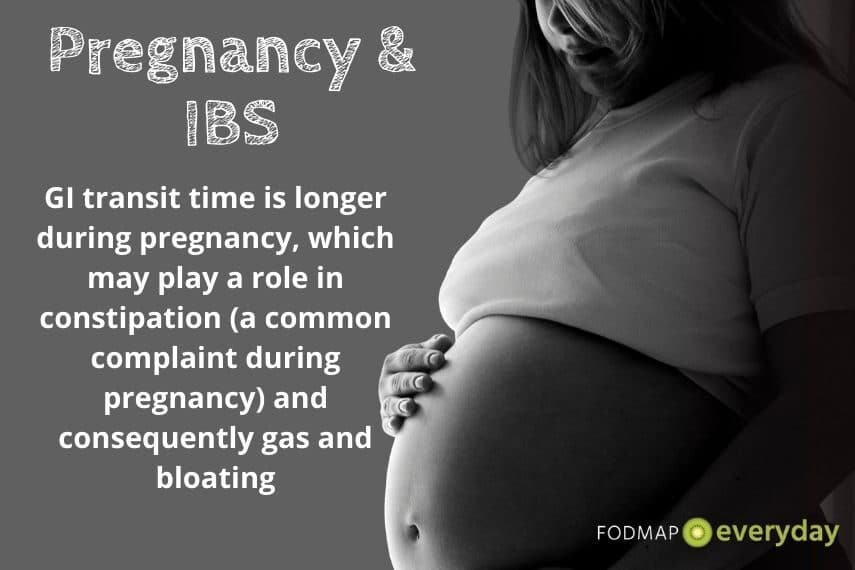
The lack of caffeinated coffee during pregnancy sure did not help my IBS-C with my two pregnancies. It is also worth noting that IBS sufferers have increased visceral sensitivity and the extra pressure from the baby of the intestinal wall may contribute to some abdominal discomfort.
You May Want To Read: Pregnancy and IBS Series
Birth Control Pills & HRT
Birth control pills work by changing up the two hormones, progesterone and estrogen. Based on information shared above you would suspect that these would affect IBS symptoms, however there is little evidence to suggest they in fact influence IBS.
Some women actually report an improvement in IBS symptoms, while others report worsening symptoms when they start taking birth control. Evidence is unclear so please speak with your doctor or gynecologist about any changes in your IBS symptoms so they can help determine the best option for you.
Hormone Replacement Therapy (HRT) may affect IBS symptoms. Studies suggest that HRT can increase the prevalence of IBS symptoms, induce IBS symptoms in previous non-IBS patients, and may prolong symptoms due to the hormone induced changes to the GI tract.
Endometriosis
In recent years there has been compelling evidence that IBS symptoms and endometriosis are connected. Endometriosis and IBS have several overlapping symptoms such as visceral sensitivity, bloating, diarrhea, constipation, and abdominal pain. It is often recommended to rule out endometriosis before diagnosing IBS in women.
Women with endometriosis are 3.5 more likely to also have IBS symptoms and these often resolve if endometriosis is treated medically or surgically. Some health professionals suggest that the low FODMAP diet may help improve GI symptoms in endometriosis sufferers, there is ongoing research at Monash studying this relationship.
Strategies to Improve Hormone Induced IBS Symptoms
The first step is to bring awareness to the timing of your symptoms. It would be a clever idea to keep a IBS symptom log and pay close attention to the severity of symptoms in relation to your cycle. Be sure to record when you start and end your period.
Here are some treatment options:
Stricter Low FODMAP Diet
It may be helpful to be a little more restrictive with the low FODMAP diet during days or weeks when you tend to experience more hormone induced IBS symptoms. If you are on a modified low FODMAP diet maybe you need to be more stringent with your FODMAP intake certain times of the month.
Pay more attention to portion sizes of moderate (yellow coded) foods. If you have identified mild or moderate triggers during the low FODMAP Challenge phase consider limiting or avoiding these foods during more sensitive times. Try to expand your low FODMAP meal and snack ideas to ensure your nutritional needs are being met.
Fiber Modification
Adjusting your fiber intake with a focus on more low FODMAP fiber rich food sources or FODMAP friendly fiber supplements can help regulate bowels if you suffer from either constipation or diarrhea at certain times of the most. Please see our article Fiber and IBS: What You Need to Know for helpful guidelines on how to increase your fiber load.
Alternative Therapies
Explore other therapies to reduce IBS symptoms such as yoga, and meditation. Practicing these healthy habits on a more frequent basis during your most challenging times may help increase motility, improve gut-brain connection, and more.
You May Want To Read: IBS & Yoga Series – It’s Your Body!
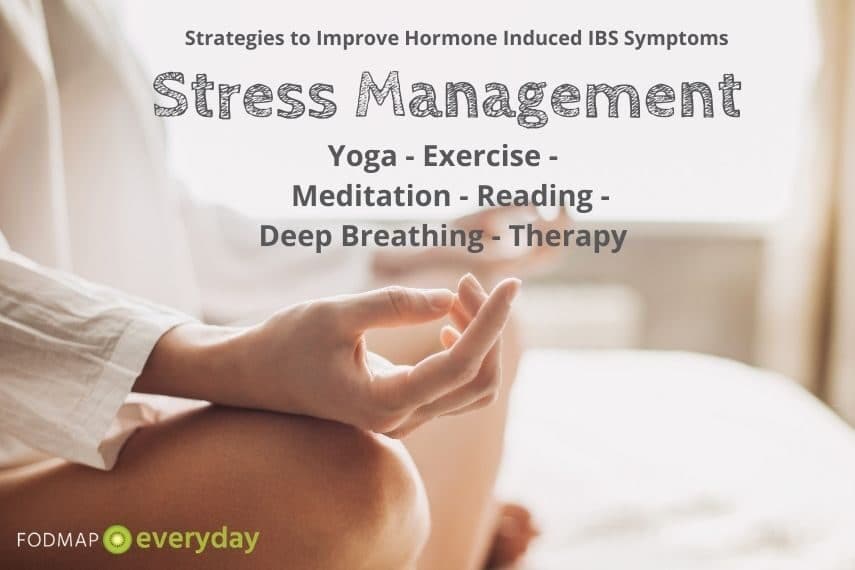
Stress Management
Stress can negatively affect the gut brain connection worsening IBS symptoms. Working on helpful stress management tools such as exercise, meditation, reading, deep breathing, therapy, and more can all help reduce stress levels. I often encourage my clients to think inwards and search for things that bring them joy. Finding peace and pleasure in life can dramatically improve mental health.
Exercise
Light, easy exercise such as walking, hiking, swimming, and biking can reduce IBS symptoms such as constipation, excessive gas, and gut transit time. It is recommended to start with more gentle type exercises as more intense, strenuous, challenging workouts may have a negative effect on IBS symptoms for some individuals.
You May Want To Read: How To Avoid Gastrointestinal Issues During Exercise
Hydration
Stay on top of your fluids to ensure you are meeting your daily fluid needs. Water is the best option and optimal intake is 64 to 80 ounces per day. This fluid goal may need to be adjusted based on weight, heat, exercise, and more. Please follow up with a medical provider or dietitian for more tailored recommendations if needed.
Supplements
Peppermint capsules and peppermint tea may help reduce stomach pain and bloating. My favorite peppermint capsule brands are IB Guard and Pepogest.
Gas X or products with Simethicone may help reduce excessive gas when taken with meals.
Digestive enzymes may help break down galactans, fructose, or lactose and may be used to help improve digestion if these FODMAP groups have been proven to be your FODMAP triggers.
You May Want To Read: Enzyme Supplementation and the Low FODMAP Diet – Can It Work For You?
Gut Related Hypnotherapy
Targeted hypnotherapy has been proven to be an effective treatment option for IBS, with symptoms improvements comparable to the low FODMAP diet. This may be worth exploring to help one achieve better management of IBS symptoms.
You May Want to Read: Gut Directed Hypnotherapy: Promising Therapy for IBS
Resources:
- Sex hormones in the modulation of irritable bowel syndrome – Agata Mulak, Yvette Taché, and Muriel Larauche, World J Gastroenterol. 2014 Mar 14; 20(10): 2433–2448. Published online 2014 Mar 14. doi: 10.3748/wjg.v20.i10.2433
- Meier R, Beglinger C, Dédérding JP, Meyer-Wyss B, Fumagalli M, Rowedder A, Turberg Y, Brignoli R. Influence of age, gender, hormonal status and smoking habits on colonic transit time. Neurogastroenterol Motil. 1995;7:235–238. [PubMed] [Google Scholar]
- Lampe JW, Fredstrom SB, Slavin JL, Potter JD. Sex differences in colonic function: a randomised trial. Gut. 1993;34:531–536. [PMC free article] [PubMed] [Google Scholar]
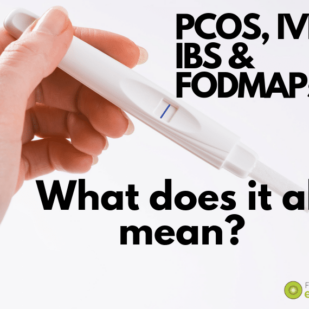






Although they haven’t gone away completely, my symptoms definitely improved after menopause.
Fascinating! As we always try to remind people, our GI tracts are not static! There is always the possibility of improvement.